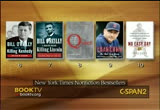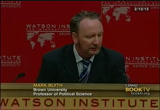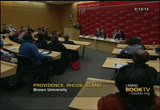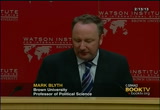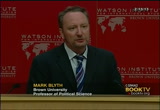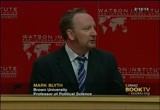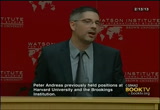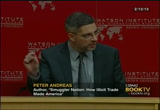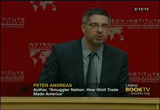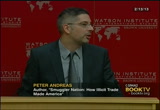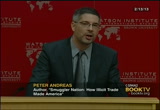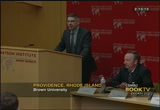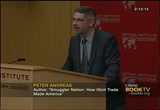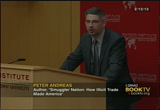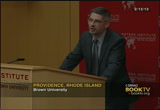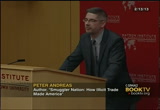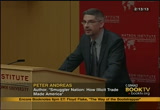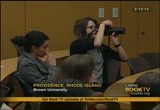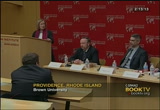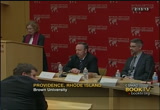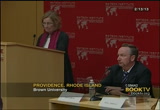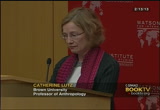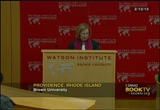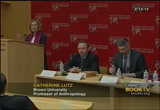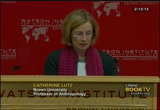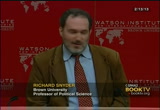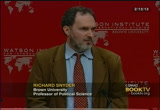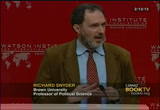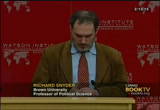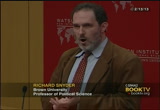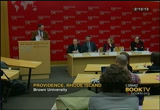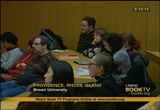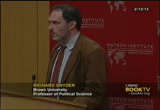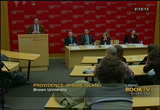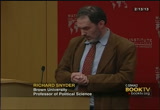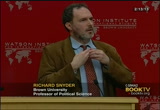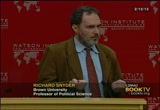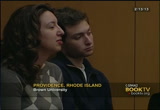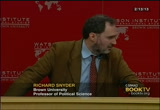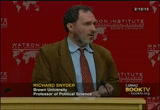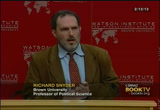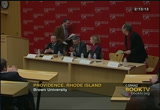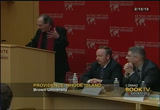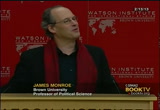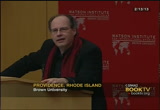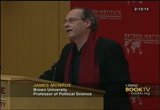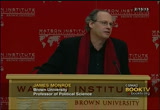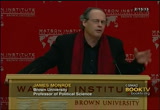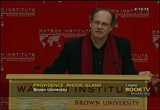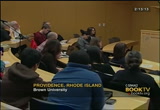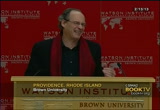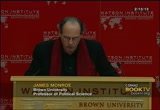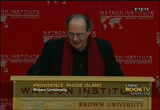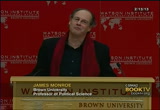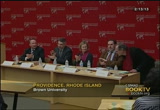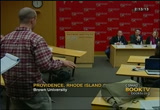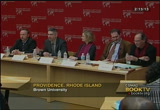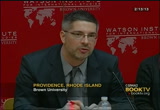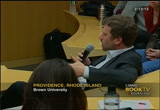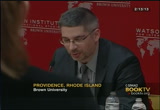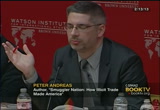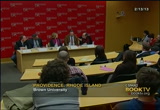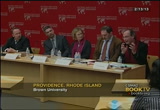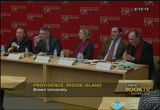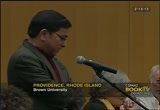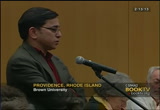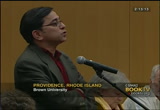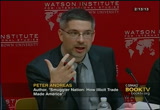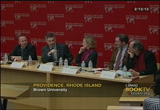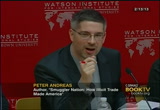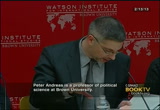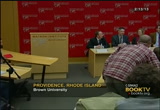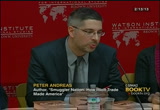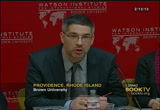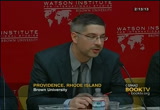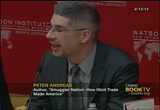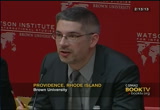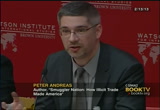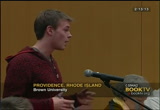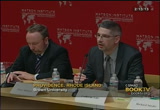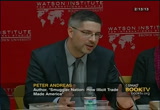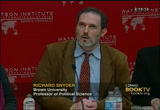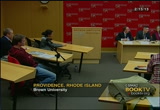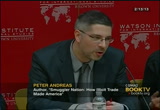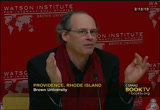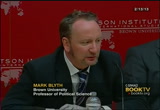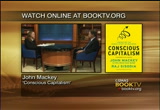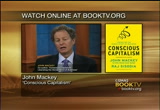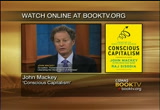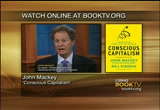tv Book TV CSPAN February 23, 2013 4:30pm-6:00pm EST
4:30 pm
for more on these bestsellers coach said new york times website and click on arts. >> and now on book tv computer andres talks about a long history of smuggling in the u.s., which prior to the revolutionary war was driven by a desire to grow domestic industries and bypass paying import taxes to the british. it is about an hour and a half. >> good afternoon and welcome to the watson institute for international studies. the discussion of peter and raises new book, smuggler nation, hal illicit trade made america. housekeeping, i have to mention some things. the way we're going to run this is as follows. i will do a brief and perfunctory introduction. and peter is going to get up and talk briefly about the book is obviously most of you have not read the book. this will become a stanley
4:31 pm
one-way conversation. after this will invite richard and james to say their piece on the book, and hopefully we can get stuck into a good discussion of smuggler nation and its aspects. at that point, we will open it up for q&a. you will see it is one fix microphone, and another mobile microphone for this side of the house. if you wish to join the q&a, please, if you're on this side get up and stand behind a microphone. we have to do it this way because there is no mobile microphone that we can use for recording for c-span, and we do what your questions and answers to be an integral part of this broadcast. so there we go. without any further ado i will begin my brief introduction, even though it was kind of redundant because obviously i've just an introduction well as to investing. so, here's the book. there we go. it's bake. now if you know peter you will know that this is unusual because he tends to reassure books. and there's nothing wrong with
4:32 pm
that. it's great, but it's a bit of a surprise when you see a big one. you think yourself, all, this is serious. but i noticed a few things about this book. i'm going to say seat -- i'm going to say three general things. this bookmarks his exit from the community a political scientists. because it is something we have all written. it is actually enjoyable. it is quite readable unclear. it is utterly devoid of jargon. and powerful and very political message. the second reason to like this book is that it is not devoid of theoretical asked. rather just theoretical pretension. because of what it says, and he laughs off their well-known sociologists. and this standard moral we have in the social sciences or how
4:33 pm
state farm then build the conforming parts that they built is that states make war and wars make states. that is to say to me any revenue to go off and beat the living daylights out of other states. so when the process you develop these extractive and administrative capacities and how you do this determines the type of state you end up with. and peter has come along and basically said, yes, that is right, but not quite. as well as being the basis of external forces, there is also a year on population, also the people across our borders, also the people you want to keep out as well as the people that you want to bring in. the monitoring, registering, the capacity building, the engineering that goes on with this that makes the state into a state. and we are remarkably blind, willfully so as to how much of this state is a police apparatus and how much of that policing has to do, not just for the extraction, but with exclusion and how much of that excuse and has to do with regulations and regulations as to who we are into we think we are into we pretend to be in the world.
4:34 pm
the last thing i want to say about the book, my introduction, there is no entry in the index for the world's hypocrisy, but there should be. the moral outrage, ever so slightly throughout the book. peters outrage over the hypocrisy of all of this. the fact we have had 100 year war on drugs that produces nothing except casualties. the fact that the united states was the world's biggest technologies dealer throughout the entirety of the 19th century. it did not give a damn about foreign. imported, call the weather was. and then the people in the country resold it, the fact that we are a nation of astonishing. [indiscernible] is something we need to come to grips with. i think the smuggler nation is a really good way of starting that conversation. that is my introduction in that will pass it over to the author himself to say why he wrote this
4:35 pm
book and what he hopes to achieve in doing so. [applause] >> thank you, marc. he stole a few of my punchlines, but that's okay. tell you a little bit about the book before people comment on the book. a little strange if he did not know a little bit of the background about it. first, i will tell you very briefly what the motivation was. the motivation is really, i can't think of any policy debate in washington which it suffers from a more severe case of historical amnesia and discussions about border control, border police in, transnational crime, trade, trafficking of all sorts. the more i looked into this, whether working on for quite some time, just years or decades but, in fact, centuries. so this is a corrective of
4:36 pm
storting of sorts, bringing history back in, if you will. in the argument is really just the title of the book, how it made america. perhaps satisfaction as a writer, i discovered that it was even more true than i thought at the outset which is you cannot really explain the founding of the country, the american revolution, the republic, wars of various sorts which i will tell you more about in the second panelist for expansion, the slave trade, economic development, border dynamics and so on without taking into account that dynamics of various -- various sorts. with that one front and center in the story of america, retelling the american ethic through the land of smuggling. and there is also various pieces of this, right, the drug trade, migration, so on. but this is a 300 years sweep, and so it is of first take.
4:37 pm
is the first reading of the american ethic and his relations and america's relations with the rest of the world through smuggling. incense we are here at brown university where i teach in your students and my colleagues, one thing that i felt particularly interesting and quite dramatic and shocking is the importance of brown university. and the tiny state in the nation punching above its weight significantly in the round of illicit trade from the very beginning. in the great irony that actress in the book is that a country that grows through smuggling, in fact, was given birth through smuggling yesterday the world's leading policing superpower, the most aggressive, enthusiastic, anti smuggling crusader, if you will, so it is quiet transformation.
4:38 pm
mark used the word hypocrisy. certainly there is hypocrisy. but not even sure the word hypocrisy appears in the text itself. amazon, you can go. um wondering if you punch in the word, does it come up? because i have not checked. so let me just tell you, my time , four stories. i cannot tell you the whole book. sixteen chapters and so one. but for stories. one of the stories was the relationship between the illicit trade and warfare. all of these stories, by the way kenaf contemporary revenues, relevance, lessons for today. there is much talk today about the relationship between commodities in the war. for example, cocaine financed guerrillas in colombia or opium financed mujahedin in afghanistan or ivory smuggling relates to the conflict. but -- lead diamonds, a
4:39 pm
popularize term to describe the relationship between the illicitly traded diamonds in africa and elsewhere. what i do is actually looked at the u.s. experience in this round. it is actually a very old story. the united states mastered the relationship between illicit trade and wore long before we talked about commodities, but diamonds, and so on. in fact, it goes back to the very founding. after all, how can george washington actually supply his troops without massive smuggling of gunpowder from western europe and the caribbean since we actually had no but domestic and power capacity. and who made the money? one of them was one of the founders of brown university who sold gunpowder an exorbitant prices to george washington. there is correspondence. we have no choice but to do it because of extreme circumstances. he probably emerge from the war
4:40 pm
because he was such a profiteer for the american revolution. fast-forward a little bit to of the war of 1812. most people the remember this war. marley important and one of the main reasons the united states failed to aniks canada. turned out we were more interested in illicitly trading with an inviting them. cross border residents were actually quite intertwined economically, not 70's about fighting. in fact, british troops in canada were greatly dependent on the smuggling in the american to keep the church alive. and it would have been in much more terrible shape of american forces could have stopped the flow. we know the story which was alluded to which was the whole intellectually property-tax debate which was a hot topic today, especially fingerpointing in china and other countries. in this chapter i basically emphasized that other countries, do as i say, not as i did.
4:41 pm
and from the very good go america's motive industrialization was not focusing first on domestic innovation, but actually aggressive, widespread, enthusiastic, overt theft of european, especially british technologies. alexander hamilton was the most enthusiastic proponent, aulos official state policy, the need to go out and do this. interestingly enough another brown brother has a crucial role year, not john brown, the bad brother, the slave trader, the property from the war, but denies brown brother, the quaker, the pacifist, the abolitionist, moses brown. moses brown hired samuel slater. simulator is considered the grandfather of the american industrial revolution. he has been credited. prole in overstatement.
4:42 pm
but cut it would appeal any side and he will be credited to my tab forever in history. well, who? the smuggle himself in the fines of extraordinary strict british innovation loss that did not allow machinists skilled artisans like insult to leave the british isles precisely because if he did say when that hell bent. so he would pretend to be a farmer or some such, smart lens of the new york. moses brown heard about him. it starts a new in pawtucket. and he actually had some small machinery to work on to see if it might help. turned out to be mostly uses, so the kind of cannibalize the parts and the rest is history. the stories about fortunes made from illicit trade. today everyone is talking about
4:43 pm
how much money pomelo escobar made. he actually made the list of -- forbes list of the wealthiest people in the world. i think of mexican drug trafficker has joined that infamous list. if you're on the list your days are probably numbered because are garnering too much attention, but if we look back in our own history, some of our founding family fortunes are built on the illicit trade. here, of course, i already mentioned the brown brothers, the hancock family in boston. we can look to america's first multimillionaire, john jacob astor. how did he make his money? he made his money deviling in opium smuggling, dappling in trading with the enemy. most importantly he made his money by selling illicit out of the native americans in exchange for much coveted and profitable first. trade was banned by the federal government but poorly enforced. so the m rating to unamerican
4:44 pm
trading company to specialize in exchanging a call for further he is remembered as america's wealthiest man, first multimillionaire. last but not least, there is much talk today of immigration reform debate that has been going on for years now, how our borders are out of control. the languages do we need to regain control. how can you regain control of something if you never had control of it in the first place? in fact, america was built for better or for worse. from the very disco, and this is the state of building that mark alluded to. the very effort, however and perfect and failing, to try to regulate border crossings of all sorts built up the american. such with one of the first uses of american and federal government at a time when it was so anemic which was. [indiscernible] well, let's test as trying to do? in four straight loss of the weakest of the smuggling that was so crammed that during the
4:45 pm
colonial area. suddenly stop what it actually was encouraging marches to do just a few years earlier. certainly smuggling was not patriotic anymore. it was actually hitting at the court of the state coffers. so, we look at the u.s.-mexico border as exhibit a today of out of control borders and the need to regain control of emigration, secure the border first before we can do it all. immigration reform. a stalling tactic, but it also shows a gross disregard and ignorance of history. after all, by any historical standard america's borders are far more secure, far more controlled, park far more surveiled, monitored, police, and so on today than ever afford american history by a long shot, especially the u.s.-mexico border. and as much as we focus on the u.s.-mexico border, you can look back not too far in history to show that the u.s.-canada border
4:46 pm
actually plays just an important, if not more important role in illicit trade of the decade him over the centuries. as i mentioned, is starting with the war of 1812. just for to prohibition. the true ones are crossing was just as much of a smuggling superhighway as to help us so yesterday. how quickly we forget. all the finger-pointing, but actually back then there was a lot of finger-pointing. in fact, so much corruption. there was almost policy ted without permits for warehouse is right on the river so that they could facilitate the running about all across the river, attending there were going to cuba. looking the other way. so taking more time than i should and i let my colleagues let me know how much they enjoy not the book. thank you very much. [applause]
4:47 pm
>> and professor of anthropology to open up on peter or perhaps on smuggling nation. >> okay. great. this is a wonderful book. it will be on the best-seller list. that limit elected the best-seller list because the book does strike me as a distinctive. so, look, the books on u.s. history that capture the american imagination have the best marketing team are pretty narrow bunch. they tend to be about the founding. that would tend to be capitalized. or they tend to be about soldiers of four and that is suited. also about individual u.s. presidents. so this is no different. you look at that list. the top 20 list on amazon have nine books on past u.s. military activities.
4:48 pm
snipers and seals and world war two missions ncaa hostages activity and rescue. we have the history on the vietnam war which is the only one civilian senate. but, again, it is part of this cluster of mind. there are six books on president's. a founder, thomas jefferson, and three, steven spielberg's of work on lincoln. so this stands out from the crowd in several ways. first of all, and focusing on individuals and their choices and values, as the standard history often does, this investigates a broader social and political prophesied through which very colorful individuals move and do there work. across an ambitious a long swath of centuries to texas to these cultural and economic and political process these that in fact give us the very idea of a border. and the national and
4:49 pm
international declarations that makes certain objects, for example, including seven glasses of people, things that should not move across borders. that changes over time. for example, the british lead the effort to suppress the slave trade, the racial categorization of who was or was not desirable person to cross our borders at various points. taxes and duties on tea and other things which, again, come and go. so often talks about the much broader and more significant consequences of the notion of smuggling. do or don't come across our borders, but the strengthening of federal policing institutions in general of the course of the century as a result of the attempt to control spiraling. finally a variety of contemporary on domestic border crossings of various types.
4:50 pm
and we know these pervasive damages of chinese immigrants in boxcars, tunnels under the u.s. border from mexico with drugs running through them, trafficked women is the latest moral panic about coming across. so, the notion that they're giving us is prohibition is self is the original impetus to these kinds of the economic strategy. the legality of these things is the culture of its, the phenomenon. and he shows us a piece of evidence, what counts of smuggling, we can see the connections between the american panics and anxiety in the kinds of material conditions that -- material interest of government and smugglers and as a make a profit by managing the border can be seen throughout the book. so, well speaking to the
4:51 pm
broadest audience of readers, often cases that show the value of writing academic work which includes some of for example, mary douglas county men's regularly traffic. not to state borders, but other entities. working inflows and outflows, closely and anxiously monitored. often consistent with the crossroads of sciences of the last number of years to focus on the singularity, the thinness of the state of government and to understand the ubiquity of transnational. the book stores illustrate what has been said about the cultural construction. in politics and culture than universal codes that the united states and forces. also shows how we tend to think of smuggling is the exception
4:52 pm
when, in fact, it may be more the rule. turns out to be better conceived and announces a problem as it is trying to solve, but often as the route by which the state and the elite, who even under democracy relate at the helm of the ship of state, achieving some of their own hands. again, this is the reason that his book starts with his first footnote. as mark mentioned. and the conventional wisdom about the state and war. and i think you can see the point about the state as a protection racket which is the notion that the state bar's legitimacy by protecting the people's as sometimes generated in the same way his mother is the figure that the state protect the people against those who would violate our borders and in that way garner legitimacy, even as is often
4:53 pm
constantly and more exclusively because it's an obsession. there is a gender story here, too. the masculine state projects that benefit -- feminine populace from the threat, so in that way there is those summation of less certain kind of gender. i'm so it's lively, i expected, navigates expert in between the details of the cases, the smuggling, industrialization, and changing labour relations in global relations. national history suggests we think the eddy of the solidity of the nation or the idea that a state comes into being and exists because it has borders and exercise sovereignty with the stroke of a legal ban. and to suggest, also pointing out that the emerging imperial reason that has created this, a
4:54 pm
certain kind of imperial reason has created this. it is said that exceptional a study that america was founded on love, that even if it is now secular, nonetheless seemed to have been made by god rather than found it in a more complicated human politics of the struggles that he has felt and well illustrated for us. [applause] >> reflections by richardson ibook, professor of political science. >> thank you, marc. it is wonderful to be here for a number of reasons got to celebrate my friend and colleague and especially wonderful because i remember sitting with peter just up the street from us five or six years
4:55 pm
ago. i don't resent here remember. he shared with me about a seven or eight page prospectus for what eventually became this book, and it is a pleasure that is now here and can be shared with all of you and made public. in a way, i feel like all i really got to do today is just a congratulations, peter and sit back down. [laughter] i can't get away with that, you know. my role, in addition to that, is to push and pull and stir things up a bit. so i will try to do my best. so, smuggler nation has a lot of history. that is partly why it is such a bookmark. history, in american history. by definition is short.
4:56 pm
[laughter] it is partly a book of history, but this is a much more ambitious book than just a book of history, short or wrong. peter very self consciously tries to speak to the present, to use history to speak to the present. and even set politick. no, this fits very nicely with the mission of the institute for national studies that we're standing in today which is to bridge the world of scholarship and practice, to bring scholars and practitioners together. so, peter's retelling of american history or american political development through the prism of the illicit trade in efforts to control it is an example of what we might call publicly engaged historical analysis. we don't like that term just because it's a little too stuffy? how about just useful history? or maybe usable history.
4:57 pm
and yet the that history might be useful and even usable rests on a claim been that the past can offer lessons for present action. to put this a bit more strongly, it rests on, as the philosopher has been member for st., the belief that those who do not remember the past are condemned to repeat it. in other words, we forget the past at our peril. in asia is dangerous. this is true. this is true. how useful, in fact, is history for practitioners, the people who must act. there is an opposite view on the utility of history, opposite. equipped with him is that we
4:58 pm
learn from history that we learn nothing from history. we are made wise not by the recollection of our past but by the responsibility for our future. there is actually a whole scholarly industry on misplaced historical analogies, the misuse of history, policymakers learned the wrong lessons from the past. maybe a don't repeat the mistakes of the past. that's nice. they create -- they have new mistakes. they may be worse than the old ones. for examples of misplaced analogies, wonderful book called analogy's a war. he provides an example of how in the summer of 1965 the u.s. ambassador to south vietnam
4:59 pm
enveloped the conference at a cabinet meeting and succeeded in helping persuade lyndon johnson to escalate the war in vietnam arguing if the u.s. did not intervene in vietnam world war three would be unleashed. as he put it, can't we see the similarity to our own impotence? so, history had been misused. history, like many religions, is multi vocal. that is, it is valuable. can be interpreted and deployed in ways that consciously, strategically or not simply suit the interests of the interpreter . so history can be useful. it can also be misused and even
5:00 pm
5:01 pm
"smuggler nation: how illicit trade made america." hijacking is a pretty sensational term to me. so how do peter andreas do it in this book? well, i think that he skillfully avoids in providing this present perspective. the other extreme that there is nothing new under the sun. i think this is most clear in the balance chapter, there is a subheading that is quite telling. so some things are new. for example, some of them do have greater global reach even if the extent of this reach has been exaggerated by the journalist and people of hollywood. it is indeed probably larger than it used to be historically.
5:02 pm
and there is also a relative share of illicit trading and global trading that is not so different from what it was. things that used to be illicit are not illicit today. for example, marijuana. it is becoming increasingly more illicit and also the banning of condoms at the beginning of the previous decade and medical arguments for the use of them. and part of them is the legalization of condoms. in the past, they were illicit today instead of then.
5:03 pm
for example, slave traders could not have imagined that slavery would be illegal. so what we get is a balanced and more complex and nuanced and therefore less distorted and clearer picture of history. this balanced perspective of the book comes up in another way that i think is very useful, the dependency then and now, either then and now are totally different, or not definite all. another is good and bad. okay? good actors, good guys and bad guys, they will be divided into the good cops, the good regulators, the good enforcers, and the bad smugglers. well, things are more complicated. some of the enforcers are the bad guys and complicit and illegal operations that they
5:04 pm
have passed for example, cia exploitation of illicit networks during the cold war conversely there are examples of criminals who are virtuous. and if not virtuous, at least legitimate. peter mentioned at the outset, patriotic smugglers during the colonial war during this time in this country there are existing economies between good and bad. it was alluded to a moment ago by pat in her comments a moment ago. it feigns dynamism. it reminds you that what is forgotten now may not always be so. the impermanence of what is
5:05 pm
forgotten. it is an antidote to naturalizing things. how things are, how they will be, and how they should be. how the book challenges us, well, we have many episodes of demonization and also what we might call dehumanization or purification. these are very telling because it sheds a light on who gets to define what is permitted and what is not. based on the power to define what is legal and what is not. in the book it talks about before the revolution and in the
5:06 pm
late 19th and early 20th century, we saw the purity crusader, his name was anthony. he was responsible for being against illicit images and condoms being illegal. this is all forms of contraception including commons are legal. including the issuance of condoms for u.s. soldiers and etc. i will deconstruct the incompletion voyeur. you can't see it, but it has a picture. he is dragging in a young woman and he is standing in front of a judge in a courtroom, and he says, your honor, this woman gave birth to a native child.
5:07 pm
[laughter] the processes of this, dehumanization and criminalization, were long in history. john hancock was a smuggler. his family was involved in smuggling, but he is a hero. brown university. when you think of brown university, being complicit in slave trading does not come to mind for most people. this is a legitimate and good institution. but his roots or maybe not so pure. how is this wrongdoing accomplished? an effort to provide a more balanced image of something
5:08 pm
here. okay, one last point, then i have to stop. it is a shepherds came thing. so how hard is the argument travel? not historically for the united states, but spatially to other countries of the world. now, people have mentioned several times which was that peter makes on charles when he comes up with the solicitous raise that smuggling make states and states make smuggling. he defines what is a legal and what is not illegal. he also argues, peter argues, that all nations are smuggling
5:09 pm
nations. i believe that that is true. i work in latin america, that is the reason that i know best. basically you make a wall, you make the loophole at the same time. however, the power to be hypocritical is not distributed evenly across the globe. some countries are not makers and breakers, but rather takers. okay, just like most countries of the world. so if you do find smuggling by what is legal and not illegal, some states have a greater influence across the world than others.
5:10 pm
in latin america, the war on drugs, and, you know, to say that colombia, peru, bolivia, smuggling nations in the sense that a thomas lee those governments and states of those countries choose to define coca as a legal and it would not be useful. so it would be helpful for me to refer you to a another book that peter andreas wrote. he takes on the issue of who gets to define what is forbidden and what is not forgotten. let me conclude by thanking peter for giving us a useful work of history. thank you. i'm not. >> we have james burns, who is a political science professor here. >> thank you, it is such a
5:11 pm
pleasure to be commenting on my colleague's book, peter andreas. samuel slater had worked for richard wright, it was crucial for textiles. and then we re-created that textile, and the idea that this great tourist attraction in rhode island was a pilot. it takes some getting used to. peter says to china, sorry, china, do as we say, not as i do. you have gotten a sense already, it is about foreign relations and government expansion it is
5:12 pm
so well-written. i can make an important argument is not previously. i can make an important argument that people will like to read. and for that, this book is a call in the debate of our discipline. i want to tell you about this book and then try to sort out the mischievous tone. there was john hancock, the first signature, the the man to
5:13 pm
sign the declaration of independence. signature so large, as he put it, king george will be able to see it without his spectacles. a smuggler. and that is okay. he is a patriot. in fact, can i see this on television? peter appears as the first smuggler in this book. going from bolivia to peru. bubbling toilet paper. don't ask, read about. [laughter] this comes up again and again in american history. we have the story about the oklahoma land rush. it's not in peter's book, but 1889, thousands of people on the oklahoma border, and at noon sharp on april 22, can sound and the sellers go rushing in to grab the land and discover that some of it has already been taken by people who cheated and bribe the government agents or
5:14 pm
where the government agents themselves. how does oklahoma remember this? it calls itself the sooner state, for the people who snuck in, sooner than everyone out. we celebrate the cheats. what an easy-going nation to cheer us like stallions. [laughter] there is another story. a very vivid story. it becomes striking as the book goes along. that is the story of a repressive nation, all at the same time. this repressive nation. i may sound like something that is finally coming of age, which is what you want to do instead of drinking wine, but two years ago, 750,000 americans were arrested. they participated in marijuana, that's down from almost a million two years ago. in fact, the united states has the world's largest prison
5:15 pm
population in some large measure for the very reasons that he describes. 6 million americans are in prison or jail on parole, or under prohibition. 6 million americans in the criminal justice system. the story of a repressive country, a country that is fearful and thoughtful, comes to a point in the immigration stories, the story that comes up multiple times, and all of a sudden, the story of the wind sing america becomes the story of a terrified america. in that we begin to see exactly what separates the two americas. immigration and worry about immigration is as old as america itself. one of the first great american best sellers, book by maria monk, it was an account of
5:16 pm
catholicism. priest did terrible things, murdering the babies that were produced and etc. i was stunned to read in peter's book that despite all of those various forms of horror of immigration, it wasn't until the 1870s that it became a question of borders. and it became a question of borders about the 1870s. they tried to resist prostitutes, lunatics, idiots, people of moral rectitude and all around the dispute began of the chinese immigrants. mexicans, no problem at all. they could come and go as they wanted because they wouldn't stay forever and in fact, the great late chinese smuggling was to pretend that they were mexicans. how things change. the immigration story is kind of
5:17 pm
a deal to america. when did it trigger an intense alarm? peter, i am interested to hear your comment. when it is about smuggling creates alarm. when it's about the definition of america itself. when it's about defining us as oppose to them. it really triggers the most intense border protections that americans know. when the question of who we are in the united states, the borders are declared loose. when it becomes a question of us versus them, when it becomes a question of culture war, then it's a different story entirely.
5:18 pm
in two stories, one war and tolerant individual and the difference on this question, this construction of who we are. i read this before, economic suffering is all over the map. sometimes intensely, sometimes not as intensely. it is far more intense not surprising in this nation. but the greatest intolerance is smuggling that has something to do with the question of who we are. the smuggling of the irish, the stories of the irish black american students. those are the ones that really get america going. let me conclude by just giving you one larger tale in this book. that is the tale of prohibition that i think ties together many of the strands that i have been
5:19 pm
suggesting. prohibition, if you haven't read it in the book, you will be surprised to hear that it arguably is the most sustained reform movement in american history. if you take simply the number of people involved, the percentage of the population, it is not even a contest. then after endless efforts, americans stop the drinking of alcohol -- no, let's put wrong. they tried to stop it, the drinking of alcohol, from coast-to-coast. [inaudible] big cities were full of foreigners who hung out in saloons and had to be controlled. they were ruining america.
5:20 pm
people in the heartland were particularly worried about this threat of others. race, the final wave of prohibition starts in the south at exactly the time jim crow goes into place between 1905 and 1915. the idea of trying to control african-americans -- he lived to be the idea that we had to control this throughout the south. prohibition becomes very important and we are trying to keep african americans in their place after 50 years of struggling following the civil war. it was crucial for prohibition that the democrats retook congress, by the way. in the wilson administration. third, and very differently, there was a moral issue that was part of the effort to stop violence against women in the
5:21 pm
19th and early 20th centuries. where ever women's suffrage one, as it did in all the women stay, it has followed on the state level the following year. world war i, as peter writes in his book, we have foreigners, race, gender, and finally world war i. world war i made the effort of prohibition a patriotic effort. a commencement at brown university speaker says, you will be the great christian army. the most christian over the world has ever known. and then he says, and can we do anything right? and then there is a subpoena for prohibition. what a very mixed story in this chapter that peter tells,
5:22 pm
controlling them with moral aspiration and patriotism. the consequences are interesting. why rise of big government all of those things were tried. he never tried anything as ambitious as telling people from coast-to-coast that thou shall not drink. today, all of the institutions build up and they are now cheerfully applied by the supreme court in the essence to run down drugs. incidentally, speaking of marijuana, the narrative of prohibition, it is one of failure. the newspapers like to have their reporters go into a strange city and see how long it would take for them to find in the legal drink. in the big city, it could be more than 10 minutes. but there is another narrative, and that is that it succeeded. it succeeded in the conservative areas of the country.
5:23 pm
in the south and in the midwestern heartland. all of the places that wanted to say that we are not like those people in the cities. we are not foreigners. we are americans, and we believe in prohibition. to this day, half the counties of the united states are still dry. you just don't find those dry counties in places like rhode island. which is just to say that the culture wars and the efforts of prohibitions are beautifully described in this book, and they go on. as everyone has said, that's not very good news for america or our friends and leaders around the world. but it is very good news indeed for the longevity that this book will have. thank you. [applause] >> if we could get a response to some of those comments? what you think? >> i'm not going to say much.
5:24 pm
i'm digesting the comments that my colleagues have made. making sense of the book better than i did. so i was thinking what am i going to do with the next edition. [laughter] >> a footnote here, my preference would be to open it up. >> okay, we will open up for questions on the sign. there is a microphone, please stand behind us. we will go from there. >> all right, thank you for your works and service. he talked about the transition and economy and the global enforcement against it.
5:25 pm
in transition, a lot of countries around the world like to talk about that. i'm wondering if you can speak to what that transition was. and also policy issues, and second, what could the governments in south america do and as well as the administration of beijing. what could they do? >> those are great questions. let me rephrase your question, how did the united states become hedging on the global policing superpower. that is contextual in a sense, it is part of the world's super system as far as military power. the largest economy in the world. so the addition here is to look
5:26 pm
at the law enforcement side of things. not just domestically at the border, but the aggressive efforts to export our preferred police and priority laws, criminalization, and so on. this is actually drawn from the book that rich mentioned, which i did with my co-author, where it is quite striking. the moral righteousness, not the tolerance, but the exporting of u.s. prohibitions. it's not just what is happening domestically. and the u.n. agreement on anti-trafficking and anti-money laundering, anti-drug trafficking and so on, if you dig deep enough, you will see finger prints of u.s. officials all over them. there is a sense of anti-smuggling that is a story of americanization of it. but it cannot happen with the
5:27 pm
larger rise of america as a superpower. would anyone else like to jump on this question? >> thank you. >> used the microphone because it has been reported. >> thank you for writing the book. my question is about hypocrisy and maybe something else, maybe decriminalization of the drug laws and a lot of things that are currently illegal. here is the reason that i have this discussion. the charge of hypocrisy, one has to say that this person is a moralizer and to stop criticizing others. but the other way is to try to
5:28 pm
live up to the ideal that somebody was claiming to have. i don't think that you think the response to history that we have had in the past would be for the u.s. to start basically prosecuting more to increase regulation within the united states to be critical abroad. i am really concerned about criminalization and decriminalization. it is equally a response that would be more consistency, more domestic and the kind of limits on smuggling that we want to see internationally. >> another great question, which i mentioned the word does not appear in the book as far as i know, i did a book event in washington dc a few weeks ago and also the council of foreign
5:29 pm
relations. all the commentators brought up hypocrisy. everybody talked about that. it is implicit. it is so implicit that it is over and over again. but i don't claim it that way. again, hypocrisy will be underscored. trying to decipher your distinction between the two stories that you just told me about what the messages and certainly the message, i don't want people to misinterpret it, certainly not in washington that well, because the u.s. did this, everyone now today should be able to do this. so if you really took that logic to its logical conclusion, well, we would return to the slave trade, basically. complete return to past practices that i don't think anyone wants returned here.
5:30 pm
endangered species legislation, poorly enforced, very weak. and there is massive smuggling of wildlife and the united states and other countries. relatively recent in recent decades. so it's without these laws, with those species be extinct? in some cases it is probably true. it is not an argument for just legalization, sweeping legalization. but it's interesting because one can read this book am i a spec that some people well, it's kind of a libertarian manifesto. that would be partly right. ..
5:31 pm
trying to get at something more complicated, which is how we construct a way that we see the world. so we don't have a category of smuggling as expansive as the reality, so we keep making these , these various constructions, they kind of explain what we are about. and that think you could really see two different frames. one is, a peculiar set of instructions which is what peter has really seen and done. then you drop back at it and say, well, hypocrisy or dilution because what you look at them, they are such a peculiar set of phrases, and that think this is -- is someone asks, you keep talking about constructivism.
5:32 pm
what is it? a hand in this book and sycamore read this. and he really did. the policy implications are not at all systematic. and really, some think he is really arguing. greatly demobilized. this is stupid. he himself is muddling toilet paper. other things, he is saying, no. watching -- it's horrible stories of what life being smuggled into the country. you know, you want capital punishment for those people, what they're doing to the snakes . so you cannot just say this is an argument for or against a particular policy. is deeper than that. >> the toilet paper smugglers, too. [laughter] >> moving away from a toilet paper.
5:33 pm
5:34 pm
then hit to get into the world of american politics. they're turning against. now, what i -- perhaps you saw the problem. one thing, american politics. very remarkable. in a very remarkable things that have been said. i mean, they're just. [indiscernible] one thing to change. the implementation. it's very interesting work. not everyone agrees.
5:35 pm
let me remind everyone. american politics. the last paragraph contract with an argument. american. america is a symbol. america disappointment because the ideal sense. >> so you must always have a gap between what america does and what america proposes. that just as a matter, it cannot disappear. the value, the value, is. altering the american way.
5:36 pm
it is not underperforming. it is to some extent. >> never going to escape hypocrisy. i try. the feel of the evening. it is interesting, actually, you asked if it was this or this. and actually might my instincts say that is both. a false dichotomy to me if you will. in the idea versus practice that huntington pointed out as this huge gap, arguably, and this gets to the comparative question that was being alluded to end you did at the beginning of your comments which is, that is the very nature of the state. i mean, the gap between lock in its action and enforcement. and some of those gaps are most glaringly apparent in the kind of activities that we point to. arguably, the united states has
5:37 pm
had the most ambitious laws in some respects. zero tolerance on drugs. secure borders. right? this is very language, though more on drugs. suggesting it is a super serious effort to. so that suggests that the gap is a bit larger because the evasions are so glaring, and the ambitions are equally clearing. so i guess in a sense i agree with huntington, but, sure. there is a hypocrisy here. the income of people talk about hypocrisy. barr mentioned just now that he thinks that maybe i don't think it is about hypocrisy. some ways he is right, but it is so much about hypocrisy you don't even have to say it. why tell people the obvious thing in that sense? the last analysis a about your comments is that a far better job than i can in terms of moral
5:38 pm
outrage is my colleague, which when i first came to brown within a year to he published it, give me a copy. actually significantly fatter than this book. and albee honest. it was in some ways as operational. i mean, you was a colleague who had rewritten american history over centuries, through the narrative of moralizing. folksy found religion and lead balls went off to my head. the political economy story. various forms of smuggling. where we overlap in this history is the comstock story. the sex trafficking and pornography and birth control, eradication efforts and so on, and a provision story which greatly in his comments. other places we diverge
5:39 pm
dramatically, but even that construct the mile be honest. the one that was mentioned, the one image in the book that i had to track down that was in the book. it was hard to track down because i could not find it anywhere. where do you get it? the archive in the university library. listen makeup be. that one image is in both books. i was pleased that the publisher love me to reproduce over 40 images as long as, of course, pay the royalties for that. last but not least among not to take up too much time. i was looking here when your first talking about, you know, other countries being smuggler nations and so on and the british story, the opening and -- open trade. the intervention toward the end, i will just read it as short paragraph. nothing uniquely american about
5:40 pm
smuggling, of course. terrene the reason all sorts of dishes a smuggler nations. some have even been smuggler empires. consider which is a crucial role of the opium smuggling in financing that empire. the so-called drug cartel to then it comes remotely close to matching the power of the british east india company which enjoyed a doom and opulent to of monopoly and that china opium smuggling trade in its heyday. >> more questions. comments? interjections? where right to have to talk about it again. >> are we still a smuggler nation? >> sure. absolutely. part of the book, history continues. we are very much a smuggler nation today, a part of the point of the book is all the alarms and an anxiety in
5:41 pm
washington of the fact we are subordination has subleased historical precedents and arguably, depending upon how you look at it and interpret it, it is less consequential today than it was in america's founding. list of the council today from the you know, in the industrialization story western expansion. various wars of the 19th century. implicated in including america's own civil war. but diamonds. we could have talked about the term of america's independence -- the south's dependence on smuggling gotten. but absolutely. this is where the issue of changes. his comments. not just a book about continuity but change. the realm of cyberspace glenn. this is totally different. it is still smuggling, but cyberspace, virtual world,
5:42 pm
territorial borders that have been physically crossed. but massively a smuggler nation in that regard. as muddler student body. my students are experts at downloading, the police committed notices. you have used too much -- you're getting notices to tell you to stop downloading so much. your system cuts off otherwise. that is new and different. the endangered species is no different in terms of recent decades. a better discussion about the black-market baby trade which we don't talk about much.
5:43 pm
importer of babies. adoption process these. very questionable. had to shut down its adoption business because it was so corrupt and so much examples of actual trafficking. and that justice not get the attention that it does, but it is part of the profile of the united states as a smuggler nation. >> you could add the human body parts as well. >> technology is an important piece and enables not just cyber smuggling, the organ trade and so on. other point i make in the book is technology also can put some illicit trades out of business. you can imagine, fast forward into the future. you can artificially create reasonably.
5:44 pm
so it may just be a transitional x number of decades. >> one more thing. >> closer to the microphone. >> job growing. migration. curious to know what you think, will will be the future. all those fees. >> it is a great question. the immigration question, we already determined what will happen. immigration and naturalization service to-is defunct. it was folded and the department of common security. a single issue agency ims on
5:45 pm
which immigration control is the corporation is now part of a larger homeland security mission which at the top of the list is prioritizing counter-terrorism. so @booktv regardless, i don't see any dramatic liberalization . certainly relationship to mexico . the drugs, though, an interesting difference between the fbi and the da. the d.a. is a single issue agency. its very survival depends on the singular focus of one thing. the fbi will never be put out of business because there is a shift in counter-terrorism more crime.
5:46 pm
a lot of activity, racketeering and so on. so a long, healthy life ahead of them. dea, it is potentially more problematic. an interesting into the problem facing the d.a., and they have actually grown dramatically in recent decades, after 9/11. a single issue agency. drugs, drugs, drugs to my drugs. suddenly the name of the game as terrorists. so suddenly the main theme of the d.a.'s the relationship between terrorism and drug trafficking to sell the issue area. the hottest issue of the day which is terrorism. it testify and congress. on not suggesting those links don't exist or are not important, but it is interesting how the selling of that job shifted to saying, hey, we are crucially important to the war on terror.
5:47 pm
5:48 pm
i commented on the question. the state, the illicit, the kind of arm automatically. frankly, one of the stories in the book is not necessarily true our goal is now perfectly legal. we take for granted, but is far more harmful than marijuana. what is illegal and what is not. so another automatic correlation between criminalization an arm something causes to society. but your story, your second point, which is in terms of a question, really how much harm is this sort of bootleg copies of this event in the streets of mexico city or what not. and, frankly, it is a mixed bag at worst and relatively benign at best. it's certainly is such a low priority for law-enforcement that the companies that are most concerned about this often have tough cuts them, actually pay
5:49 pm
them or pay private security firms to do some of the enforcing the taken seriously because basically cops are on the road and have one thing, which is violent crime trump's other types of crime. murder is the most important thing. ip theft, you know, in the spectrum of violence in this trade it is a less violent of them. and your last point was quite telling, which is, there is an upside for companies. what is the word? plagiarism is the greatest form of flattery? so if you are a brand-name company you know you've made it. you are a when people want to copy you and pretend there rolex or promote or nike or what not. yes, they complain bloody murder about that, but the brand is, in fact among been proliferated for free around the world. right? so there is an upside. in fact, arguably there is even a recent book written about this
5:50 pm
by camarena at ucla law school. even the fashion industry, the rip-off of those designs actually spur innovation. we have to be very careful about not getting to, sort of, draconian about cracking down because we may actually repress creative forces in the first place. >> i just want to reinforce their response harmon legality a separate dimensions. emmy, to believe that everything is legal is bad in everything legal is good, you would have to believe that, you know, guns are good, legal, and condoms are bad because there were illegal during an earlier time. and one of the great utilities, uses of a historical perspective and the comparative across the national this perspective is to alert us to the menu of feasible
5:51 pm
options historically, possibilities and the contemporary moment. you can't travel to other countries are things that are illegal in one place are not illegal there and get a sense of what things might look like in the original country, and you can travel in time historically to moments when things are illegal now or illegal and get a sense possibilities. breaks you out of some plastic equations. >> an hour-and-a-half. you did talk about the ground, but he did not talk about another murder family. smuggling to the next generation and that was the kennedys. >> a good question. the candid it's. it is interesting. there is a lot of apology about
5:52 pm
joe kennedy as some kind of a smuggler during prohibition. but the best recent book written about prohibition is by someone named daniel. it served as the basis for the recent pbs documentary series. i'm not sure the director. a whole section in the book, not very long, but the myth of joe kennedy actually being involved in smuggling. he did make money and credit the in the probation. statistically speaking he was more of a speculator and a smuggler. but somehow the, it is interesting. there is this sort of taken for granted mythology that made this money bootlegging. no. the real -- the real profits years in this particular story word the brosnan is from canada
5:53 pm
who got seagram's. and then some of the family members actually founded the center for european studies at harvard and funded many totally respectable legitimate institutions in canada. they got there start through prohibition. they post, sometimes aggressively competitors aside. so they had this question of origins and complete lead not legit after prohibition. so actually a much bigger story than almost any alcohol smuggling family that we can point to. >> the california wine industry also got a huge boost from probation. it would send out warning labels the said, warning, after six months of this liquid, this business, grape juice is allowed to sit for six months. we will become alcohol and illegal. people bought it, but they're
5:54 pm
really expanded the industry. it was hard to get wind. it was -- it has a lot of volume, like whiskey. and so that was part of the genesis for the fertilization of the california wine industry. >> to examples of why that is a boost. one -- san francisco. the cartels choice. the son bunker, which is the sort of rescue work. and it was basically made to a form that could convince anyone on the customs side that this was not up all. so spicy and so dark that some kind of horrible mentioned. and quite a lot of of all. the other one, of course another relationship between the greeks and white wine and all motion. it was put in basically pine oil and c-span2 to the point that it is undrinkable, at least, if your turkish because there were the one charge it taxes.
5:55 pm
>> other questions? issues? comments? i think we will say thank you very much, to peter. thank you all for coming. >> everyone's to have something like this. >> he would like to hear from you. tweet us your feedback. twitter.com/booktv. >> i was curious what also you think the role of cbo's in talking about capitalism and defending capitalism as. do they have a role? he talked about the role of government, and have it works against business. the ceos have a role in talking about and defending capitalism and explaining it to people? norris is something uses one to purely dubai example?
5:56 pm
>> i think that we do. one of the most disturbing statistics for me is that from a longest amount of time -- you have to understand the history of the united states. we started our report. backwater. and really, as we embraced capitalism and the united states , we had tens of millions of immigrants come over here to create a better life for themselves because they have more freedom. they had the freedom to enterprise. they have the freedom to start businesses. and for the longest time, i mean well over 100 years, the united states was the freest nation in the world in terms of economic freedom. most capitalist ignition and the world. and without exception. and a shorter amount of time ago, just the year 2000, for example, the united states still ranked number three on the economic freedom index.
5:57 pm
and behind hong kong and singapore. so we were not number one anymore, will we were still number three against pretty dynamic economies, hong kong plus singapore. but over the last 13 years we have not dropped down to number 18. when people ask what is wrong with the economy, why we have such high and employment, why has disposable income per capita basis, why is that declining in has of the last ten years? the answer to me is right there. we are less economically free today that we were 13 years ago, and as our economic freedom decline stalker regulations increased, taxes increase, the engine that is the basis for our prosperity, which is business, it is lessened, and our prosperity is therefore declining as well. economic freedom goes down, so this prosperity. so if the capitalist -- is the business people are not willing
5:58 pm
to speak up for free enterprise capitalism, we can expect economic freedom to continue. american prosperity will continue to less as well. we are far from being in a free enterprise capitalism system anymore. we are really moving toward crony capitalism things where we have got big government and big business, oftentimes colluding with each other. a great example is the fiscal class bill that just passed, and we looked at the -- beneath. what you see is, you see payoffs for politically well-connected organizations such as hollywood, alternative energy which is a standout for me, but there are all kinds of special deals. we are moving away from a system where people think it is fair. the king get that through hard work and enterprise. the way to get ahead is he politically well-connected. ..
104 Views
IN COLLECTIONS
CSPAN2 Television Archive
Television Archive  Television Archive News Search Service
Television Archive News Search Service 
Uploaded by TV Archive on

 Live Music Archive
Live Music Archive Librivox Free Audio
Librivox Free Audio Metropolitan Museum
Metropolitan Museum Cleveland Museum of Art
Cleveland Museum of Art Internet Arcade
Internet Arcade Console Living Room
Console Living Room Books to Borrow
Books to Borrow Open Library
Open Library TV News
TV News Understanding 9/11
Understanding 9/11